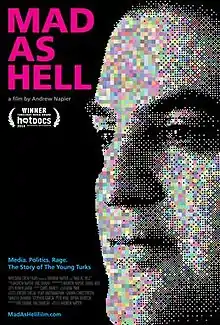Mad as Hell
Mad as Hell is a 2014 documentary film about the web series The Young Turks and its host, Cenk Uygur. The film's title refers to a famous line uttered by the character Howard Beale in the 1976 film Network, "I'm as mad as hell, and I'm not going to take this anymore!"[1]
| Mad as Hell | |
|---|---|
 Theatrical release poster | |
| Directed by | Andrew Napier |
| Produced by | Hal Duncan Eric Ekman Andrew Napier |
| Written by | Andrew Napier |
| Starring | Cenk Uygur Ana Kasparian Ben Mankiewicz John Iadarola |
| Music by | Ronen Landa |
| Cinematography | Daniel Katz Andrew Napier |
| Edited by | Eric Ekman Andrew Napier |
Production company | Wrecking Crew |
| Distributed by | Oscilloscope |
Release date |
|
Running time | 82 minutes |
| Country | United States |
| Language | English |
Synopsis
The film details how Cenk Uygur created the web series The Young Turks. The film also chronicles Uygur's time as a potential host at MSNBC before his departure on June 2011, citing conflicting views between Uygur and MSNBC executives.[2]
Production
The film was funded via Indiegogo. It raised $69,423, which was 116% of its $60,000 goal.[3]
Release
It was released theatrically in the USA on November 6, 2014 and on DVD on April 7, 2015.[4]
Reception
On review aggregator Rotten Tomatoes, the film holds an approval rating of 27% based on eleven reviews, with an average rating of 5.54/10.[5] On Metacritic, the film has a weighted average score of 52 out of 100, based on nine critics, indicating "mixed or average reviews".[6]
Writing for RogerEbert.com, Godfrey Cheshire awarded it a score of 3 out of four stars, saying that Uygur's "pioneering efforts certainly remind us how controlled most 'news' in this country is, and how much alternatives to them are needed." [2]
The Hollywood Reporter said, "Mad as Hell is far too subjective to take seriously."[7]
TheWrap also awarded the film a negative review, saying "'Mad as Hell' will probably reward fans of Uygur and The Young Turks, but much like the clips we see of Uygur in his full-flowering arm-waving wrath, it’s just sound and fury signifying very, very little."[8]
Slant Magazine awarded it 2 and a half out of four stars, and was critical of how the film focused primarily on Uygur rather than current media practices, saying "Yet instead of using Uygur as a means to further an investigation into current media practices, Napier is ultimately too enamored with the man and his convictions that the film hews more closely to being a conventional and one-sided biographical portrait."[9] We Got This Covered made a similar criticism, saying "Mad As Hell is a rare opportunity to use the life story of Cenk Uygur to say something about the modern media culture, but instead, it’s kind of about the awesomeness of Uygur, how he put together his Ocean’s 11 like team of media upstarts and rocked the so-called squares in their ivory tower, despite the fact that the man leading the revolution longed to have a corner office in one of those very same towers." They awarded it three out of five stars.[10]
References
- Rapold, Nicolas (5 February 2015). "The Righteous Ranter, Howling at Left and Right". The New York Times. Retrieved 5 April 2016.
- Cheshire, Godfrey (6 February 2015). "Mad As Hell Review". RogerEbert.com.
- "Mad As Hell indiegogo Campaign". Indiegogo.
- "Mad As Hell". Amazon.
- "Mad as Hell (2014)". Rotten Tomatoes. Retrieved 18 May 2020.
- "Mad as Hell Reviews". Metacritic. Retrieved 18 May 2020.
- Scheck, Frank (5 February 2015). "'Mad as Hell': Film Review". The Hollywood Reporter.
- Rocchi, James (3 February 2015). "'Mad as Hell' Review: Cenk Uygur and The Young Turks Explored in Doc That's More Like a Clip Reel". TheWrap.
- Greene, Wes (2 February 2015). "Mad As Hell Review". Slant Magazine.
- Donaldson, Adam (2013). "Mad As Hell". We Got This Covered.